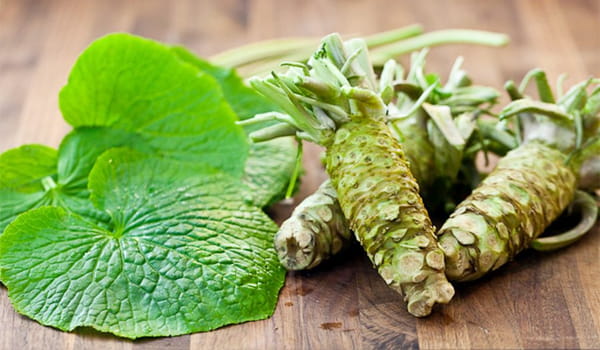The health benefits of wasabi are reduced risk of cancer and heart diseases and acting as anti-inflammatory agents for joints and muscles. It can also help to defend our body against bacterial infections and even reduce the irritating effects of seasonal allergies. The potent plant can also be used for treating respiratory problems.
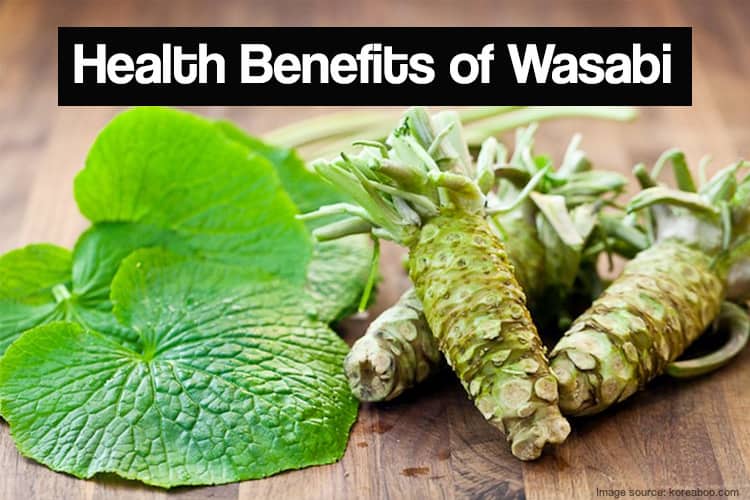
The rich antioxidants present in wasabi helps to boost the immune system and remove harmful toxins from the body.
What is Wasabi?
Wasabi is a plant and belongs to cabbages and horseradish family. It is a member of the Brassicaceae family in taxonomic classification. The plant is commonly known as Japanese horseradish, but it is a different plant from horseradish. Although, wasabi does have a strong flavor similar to horseradish. It has a strong, spicy sauce, different from capsaicin taste, which is the chemical present in chili peppers for giving them their hot or spicy flavor.
While capsaicin gives a burning sensation on the tongue, wasabi affects the olfactory sense, which releases chemical vapors affecting the nasal passage. The strong taste of wasabi is similar to hot mustard and is commonly used as a condiment in sashimi and sushi. It is also used in several other Japanese dishes.
Wasabi is not oil-based as it comes with unique chili peppers. Hence, there is no uncomfortable sensation after consuming wasabi and many people actually find it invigorating! The powerful smell of Wasabi is derived from a specific part of the plant while the taste comes from closely related isothiocyanate compounds.
The plant is used for serving several purposes. Most chefs use it as a paste, or as a powder, which is a little simpler to make.
Is Wasabi Good For You?
Wasabi makes a powerful addition to any food and can be cooked in various forms. A 100 gram serving of wasabi contains around 109 calories and only 1 gram of saturated fat. It is also a rich source of protein, fiber, and energy. It also contains iron, calcium, magnesium, phosphorus, sodium, and zinc which are essential elements in our diet. Wasabi is also packed with Vitamin C, thiamin, niacin, Vitamin A, Vitamin B6, and folate.
The plant also has a high level of certain antioxidants, like isothiocyanates and has zero cholesterol.
One cup of raw wasabi root contains about:
- 142 calories
- 30.6 grams carbohydrates
- 6.2 grams protein
- 0.8 gram fat
- 10.1 grams fiber
- 54.5 milligrams vitamin C (91 percent DV)
- 0.5 milligram manganese (25 percent DV)
- 89.7 milligrams magnesium (22 percent DV)
- 738 milligrams potassium (21 percent DV)
- 0.4 milligram vitamin B6 (18 percent DV)
- 166 milligrams calcium (17 percent DV)
- 2.1 milligrams zinc (14 percent DV)
- 0.2 milligram thiamine (11 percent DV)
- 104 milligrams phosphorus (10 percent DV)
- 0.2 milligram copper (10 percent DV)
- 0.1 milligram riboflavin (9 percent DV)
- 1.3 milligrams iron (7 percent DV)
- 23.4 micrograms folate (6 percent DV)
- 1 milligram niacin (5 percent DV)
Health Benefits of Wasabi:
The health benefits of wasabi include the following:
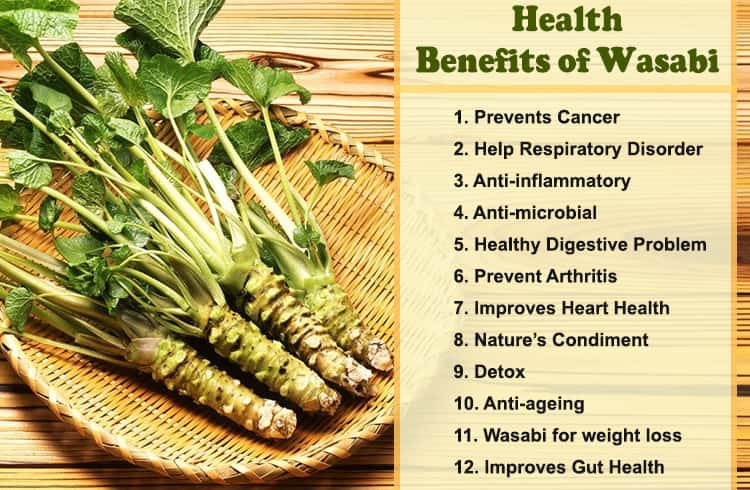
1. Prevents Cancer:
The treatment of cancer is considered more painful than the disease itself. This is a life-threatening condition that weakens the body. Knowledge about certain foods that contain sulfur-based compounds and adding them to your daily diet can be beneficial in eliminating the possibility of preventing cancer.
Wasabi is a root vegetable rich in isothiocyanates, which form glucosinolates that are essentially sulfur-based compounds. The plant also contains an isothiocyanate known as 6-MITC, which is proven to eliminate the risk of leukemia and stomach cancer. This is very effective in causing cell death in cancer cells and inhibits growth like tumors.
2. Help Respiratory Disorder:
Wasabi can serve as an effective defense line against several respiratory tract pathogens. The gaseous component of wasabi can cause a powerful reaction in the nasal passages and sinuses, which is actually the gaseous release of allyl isothiocyanate, which can actively inhibit the proliferation of respiratory tract pathogens that cause influenza and pneumonia. Its smell and sensation in the nose after consumption may be strong, but it can be beneficial for your health and well-being.
It can clear the sinuses when the gaseous component reaches the nasal passage. This can often help people suffering from seasonal allergies or common cold, to stimulate the sinuses and open the nasal passageways to increase the airflow.
3. Anti-inflammatory:
Wasabi is often puzzled with being inflammatory because of its distinct spiciness. But this is not the case. It contains anti-inflammatory agents and is especially great for sores and injuries, as it reduces the inflammation and pain, too. The spiciness that is felt in the throat can actually calm the respiratory inflammation and sore throat. Wasabi also contains antioxidants that can improve any inflamed condition in our body.
4. Anti-microbial:
The wasabi paste is antimicrobial in nature, allowing it the ability to prevent infections and viral illnesses. This also makes a great ingredient in food during the colder months, in order to prevent seasonal infections. This can also improve stomach and intestinal tract, which is exposed to elements. Wasabi is rich in antimicrobial chemicals which make it great to prevent stomach infections and food poisoning. It can also allow wounds to heal quicker as it prevents them from getting affected.
7. Improves Heart Health:
A healthy heart is essential to keep all the functions in control and consuming foods that promote heart health can be beneficial in the long run. The wasabi paste is a delicious method to prevent accumulation of blood platelets that is the cause of cardiovascular disease. The blood platelets buildup can lead to serious artery blockage and heart attack.
8. Nature’s Condiment:
Packaged wasabi is processed and several products are not even genuine wasabi. The plant is a great condiment, especially when eaten with sushi. It can also add the right punch of flavor which is better than ketchup and mustard. Freshly grated wasabi can be turned into a paste which is the ideal condiment and can be used to spice up any food.
9. Detox:
Toxins can harm your body on a molecular level and sometimes the oxidative stress can also cause damage beyond repair. It is also one of the detoxifying foods that can expel the toxins from the liver and digestive system to promote a healthy body free from toxins.
10. Anti-ageing:
Wasabi is an essential ingredient of the Asian food. People who consume them stay younger for longer. Taking wasabi can reduce premature ageing and appearance of wrinkles. This is because wasabi is a powerhouse of antioxidants and Vitamin C for its excellent properties.
11. Wasabi for weight loss:
Wasabi is a low-calorie food with a rich flavor that is often high in calories. It can also be added to salad dressings and dips to make your food delicious without added calories, and can promote weight loss.

12. Improves Gut Health:
Wasabi can prevent gut inflammation and prevent the risk of diverticulitis or leaky gut syndrome. It is also known for its high-fiber nature which improves stool and thereby improves digestive process and overall gut health.
How to Select Wasabi?
Wasabi powders and paste are quite popular in several markets and grocery stores in U.S. Most times, they are made of real wasabi. The product that is available is of very poor quality. Common wasabi powder contains mustard powder, artificial coloring, and cornstarch. Since wasabi plants are very odd when it comes to requirements, real wasabi costs more than horseradish. Hence, when you are selecting wasabi, please make sure to select only those that have clean, fresh roots. You can also follow this guideline for selecting these greens.
How to Store Wasabi?
Wasabi roots can be stored by wrapping them in a towel that is preferably damp. Refrigerate only when it is not being used. Trim the wasabi properly and remove all spots. Wasabi usually lasts for 30 days approximately. Its leaves should be kept in the fridge immediately.
How to Make Wasabi Paste?
Wasabi paste is simple to prepare as grated wasabi. You can follow the directions well before applying.
- Mix equal amounts of wasabi powder and water.
- Stir the mixture until it is thoroughly mixed.
- You can keep the paste fresh by placing it inside a container.
- Blend by allowing it to sit for 15 minutes.
- This can enhance the flavor.
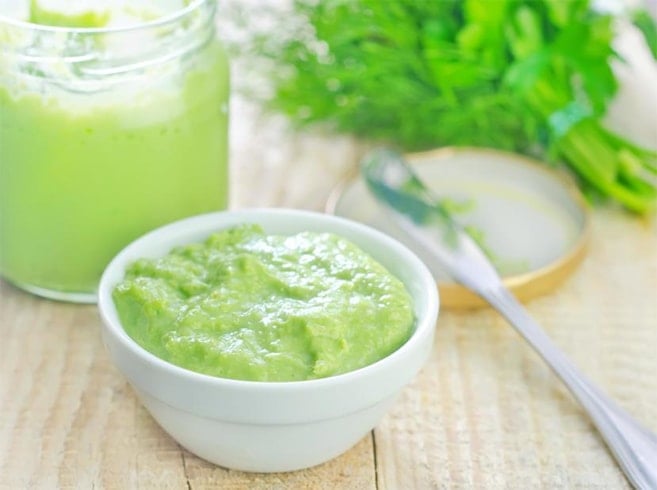
Source: findatopdoc.com
Wasabi Recipes:
There are many ways to include this nutrient-dense plant. You can try these recipes:
1. Wasabi Ginger and Garlic Roasted Red Potatoes
Ingredients:
- 2 pounds red potatoes, halved
- 3 teaspoons wasabi powder
- 1 full head of garlic
- 2 tablespoons extra virgin olive oil
- 1 teaspoon ginger, minced
- 1–2 teaspoons water
- Sea salt and fresh black pepper to taste
Directions:
- Preheat the oven to 425 degree F.
- Peel the raw garlic cloves.
- Place the potatoes and garlic in a large pot. Cover using cold water. Bring it to a boil over high heat and simmer for about 5-10 minutes. Remove from heat as needed. Finish the process by roasting them in the oven until they get a golden brown and crisp finish.
- Mix the wasabi powder in a small glass bowl and ½ tsp water. Begin mixing and add more water until a thick paste is formed. Cover and set aside.
- Drain the water from the potatoes and transfer them to the pot. Place the garlic bulbs in the pot with the potatoes.
- Take the bowl of wasabi and add ginger, olive oil, salt, and pepper. Blend well. Add the mixture to the potatoes and garlic until they’re well-coated.
- Place them on a cookie sheet or baking dish, and transfer it in the oven until golden brown. You may flip them once or twice until they are brown on all sides. Remove from the oven and serve warm.
2. Wasabi Green Peas
Ingredients:
- 3 cups dried whole peas
- 1/2 tsp garlic powder
- 1/4 cup wasabi powder
- 11/2 cups diced celery, carrots, and onions
- 3 tsp olive oil
- Salt
- 1/4 tsp onion salt
- 2 tsp tahini paste
- 2 tsp rice vinegar
- 1 tsp Dijon mustard
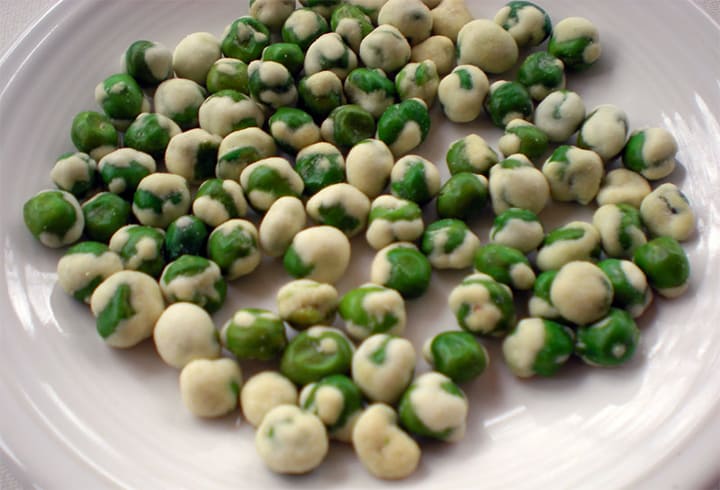
Source: canacopegdl.com
Directions:
- Soak the dried peas overnight. Rinse and drain. Transfer the peas in a large pot with enough water. Add the diced celery, carrots, and onions. Bring it to a boil and cook until tender for one hour.
- Preheat the oven to 200 degrees F. Coat the large cookie sheet with olive oil.
- Drain the peas and transfer to the cookie sheet. Roll them in the oil by tilting in the pan. Bake for 4-8 hours in the preheated oven, stirring every 30 minutes until peas are dry. Remove from oven and sprinkle salt, onion salt, and garlic powder.
- While the peas are cooking, mix the wasabi powder, tahini, rice vinegar, and Dijon mustard in a large bowl. When the peas are ready, transfer them into the bowl and stir to coat with wasabi mixture.
- Bake for another 10 minutes in the preheated oven or until the aroma becomes strong and the coating is dry.
Side Effects of Wasabi:
Wasabi side effects include the following:
1. Liver Damage
There are several health benefits of wasabi but there is one thing to remember. Overconsumption of wasabi can supercharge your body against heart disease, cancer, and liver. It contains a chemical component known as hepatotoxin which is fine in small doses but the overuse of wasabi can lead to severe liver damage as it will not able to process the toxins.
2. Allergies
Avoid foods that you are allergic to and especially if you are trying wasabi for the first time. It is important to be aware of the positive effects it may have on your body. Consult your doctor for full allergy sensitivity for a more comprehensive view of your allergies.
3. Swollen Airways
Consuming the wasabi on one go or inhaling the strong fumes can cause an immediate burning sensation and may leave your nasal passages reeling. Those who are allergic may also experience side effects from an allergy like swollen airways. So do check before consuming wasabi especially if you are pregnant.
Other side effects include:
- Diarrhea
- Nausea
- Bleeding disorder
- Digestive problems
Fun Facts About Wasabi:
- The flavor of wasabi is affected by how it is grated. The traditional method to grate it is with a sharkskin grater, which is also known as oroshi, and resembles fine sandpaper. It is best to grate wasabi as its flavor and heat dissipate so quickly.
- Since wasabi loses their flavor in about 15-20 minutes when exposed to air, you can gather its shavings into a ball to keep them together for easy use and to minimize air exposure. Wasabi that has lost its flavor can be revived back to life by grating on a little fresh wasabi into the pile and gather them all into a ball again.
- Wasabi lovers will love visiting the Daio Wasabi Farm in rural Azumino City near Matsumoto. It is one of Japan’s largest wasabi farms. The farms sell a number of wasabi products like wasabi paste, wasabi soft cream, wasabi soda noodles, and wasabi chocolate.
Wasabi can kill harmful food-borne bacteria, prevent tooth decay, reduce pain caused by inflammation, kill cancer cells, improve gut health, and even be effective as a smoke alarm. Hence, if you can handle spicy, nasal-clearing foods, add this nutritious addition to your diet.
